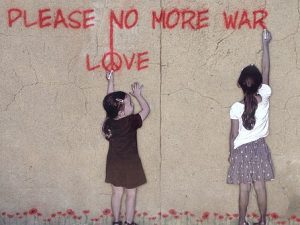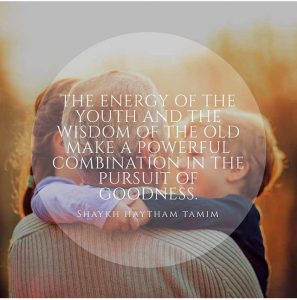How can we respond to atrocities when our leaders fail us

Spreading LOVE when there is HATE.
What can we do when we feel helpless watching disasters unfold all over the world? What should our response be? Can we afford to sit back and watch or is there anything we can do?
‘O you who believe, be patient and compete in patience, and protect your frontiers, that you may achieve success.’ (3:200)
At a time of indiscriminate and savage brutality against innocent civilians in many parts of the world without justification, when our ummah faces so many challenges and atrocities, our plight seems nothing short of desperate.
Having said this it is not the first time that our ummah faces a huge challenge. We have been there before. At the Battle of Uhud for instance, during the Prophet’s (peace be on him) time, he had never witnessed a disaster like it. He himself was injured and could have died, and he lost his very best leaders. But it was not the end.
After just a few days, the Prophet (peace be upon him), prepared for another expedition which is well known in the seerah as Hamr al Asad. It boosted the morale, the trust and confidence amongst his companions, and at the same time showed the enemies that the believers were still there and ready to fight for the truth and face any challenge.
Then Allah Almighty revealed after that:
O you who have believed, respond to Allah and to the Messenger when he calls you to that which gives you life. And know that Allah intervenes between a man and his heart and that to Him you will be gathered. (8:24)
Even after they were afflicted by defeat, by injuries, and by a crushing sense of failure, which the Qur’an called karh (deep injury), there were those who responded with ihsan (excellence). Not by complaining. But by doing goodness and through taqwa (obedience) to Allah Almighty. And they earned a great reward.
Allah Almighty sets boundaries for us, even on the battle field. We have limits at all times, which we cannot exceed. We are bounded by the Shariah, and by the revelation.
However, our ummah gets carried away sometimes. There is footage of people distributing sweets after the massacres of so-called terrorists. I wonder who are these terrorists? The civilians? The women? The children? The elderly? When entire cities are bombed, were they all terrorists?
We also have footage of some people who say that they will keep fighting and destroy other cities as well. This is the culture of hatred (bughdah), animosity (hiqad) and bitterness (karahiya), which is completely the opposite of prophetic culture and education. The Prophet (peace be on him) taught us:
‘None of you [truly] believes until he loves for his brother what he loves for himself.’ (Bukhari and Muslim)
Thus a person cannot attain the core of imaan until he loves the same goodness for others as he loves for himself.
Once a man walked straight to the Prophet (peace be upon him) in his mosque and he asked for permission to commit zina (unlawful intercourse). The companions, incensed, wanted to jump on him, but the Prophet (peace be upon him) calmed them down, and he asked the man:
‘Would you accept this for your daughter?’
The man replied ‘No.’
The Prophet peace be upon him asked,
‘Would you accept this for your mother?’
The man replied ‘No.’
The Prophet peace be upon him asked,
‘Would you accept this for your sister?’
The man replied ‘No.’
The Prophet peace be upon him asked,
‘Then how come you accept for others?’
The Culture of Love
We can see from this episode that the Prophet (peace be on him) was spreading the culture of loving goodness for others as you love it for yourself. He was spreading the culture of love. Not only for Muslims, for every human. Every human matters. As Muslims, every human is an important person to us. So what about your fellow brothers in Islam? You read the same Book, you pray the same prayer, then how can it be acceptable to kill them, and celebrate killing them?
The Culture of Hatred
It’s a common phenomenon now. The phenomenon of hatred is spreading everywhere. Unfortunately it is not an exclusive opportunity for Muslims. We have seen Brexit being promoted by hatred. Trump based his election campaign on hatred – the hatred for so-called foreigners, Mexicans or otherwise. And conveniently forgot that the indigenous Indians were kicked out when their ancestors were once foreigners on American land.
The culture of hatred leads to disasters and corruption. Those who are promoting the culture of hatred are breastfeeding their children the culture of hatred. Planting seeds of corruption, and soon they will reap the fruits of this corruption. Allah Almighty said:
Corruption has appeared throughout the land and sea by [reason of] what the hands of people have earned so He may let them taste part of [the consequence of] what they have done that perhaps they will return [to righteousness]. (30:41)
…And whoever does righteousness – they are for themselves preparing,That He may reward those who have believed and done righteous deeds out of His bounty. (30:44-45)
Passive Patience vs Active Patience
When Allah Almighty says be patient (isbiru wa saabiru), we should not be passively patient, but actively patient.
We are fed up of our leaders, governments, presidents, prime ministers, kings… We are fed up. We are just watching, and no one is doing anything. Massacres are happening. Catastrophes are happening. The international so-called community stands by and just watches. Doing nothing but condemning what’s happening.
In 2015, it was estimated that Kofi Anan the UN Secretary General made 400 to 500 condemnations for illegal attacks around the whole world. That is more than two to three a day. Condemning this and condemning that. It’s high time we took the initiative ourselves. What can be done? How can we support our brothers and sisters?
- Du’a
The minimum we can do is make sincere du’a. This is important but it is not enough.
- Donate
At least when we are asked by Allah Almighty, and we will definitely be asked what we did when these disasters happened. At the very least, we will be able to say, ‘We did our best, Ya Rabb. We donated as much as we could. We made du’a.’
- Write to your MP
Write to your local MPs. Ask them to do something. Sign petitions. Do not rely on your leaders any more. It’s a betrayal of humanity; it’s a betrayal of principles; it’s a betrayal of human rights. Let us just say it is an overall betrayal!
- Attend Protests
If there is a march, be there! Tell your friends and families. And you will be able to say ‘I tried, Ya Allah. I was there, I’m tried my best.’
- Promote Prophetic Culture
Spread the culture of love, and loving goodness for everyone. Shun the culture of hatred because it is nasty and engenders widespread evil. It leads to more atrocities and calamities in our ummah.
We need to be more active, promote co-operation and lend more support to one another. Not only for Muslims, but we should give a hand to anyone who is suffering from oppression, . We should support a just cause wherever it is, and we should be supportive of justice everywhere.
Khutbah delivered by Shaykh Haytham Tamim at the Albanian Mosque December 2016.
For your weekly dose of wisdom, subscribe to the Living Qur’an. First Month Free.
The Khutbah Project
An initiative to involve our young volunteers in learning and spreading their deen through transcribing khutbahs.
If you would like to be involved, please contact: ayesha.khan@utrujj.org
Recommended Posts

How Allah strengthens the hearts of believers
April 19, 2024

Don’t be a Ramadani person – Be a Rabbani person.
April 10, 2024



